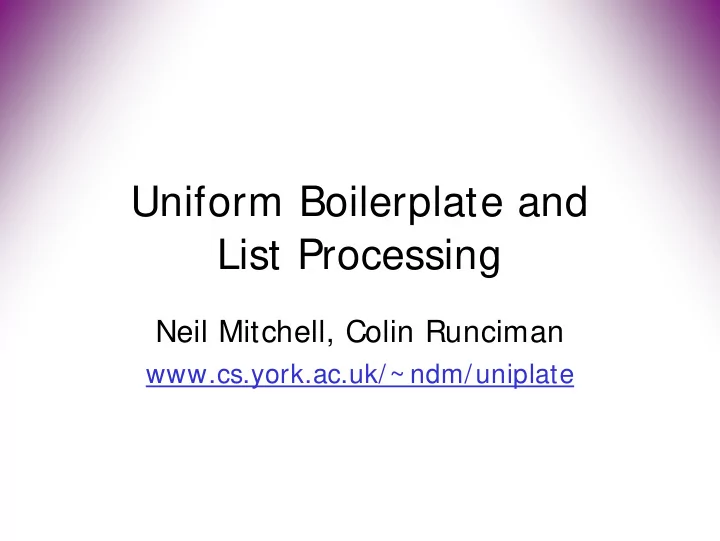

Uniform Boilerplate and List Processing Neil Mitchell, Colin Runciman www.cs.york.ac.uk/~ ndm/uniplate
A Simple Expression Type data Expr= Add Expr Expr | Sub Expr Expr | Mul Expr Expr | Div Expr Expr | Neg Expr | Val Int | Var String
Task: Variable Occurrences Type signature is optional The interesting bit! variables :: Expr → [String] variables (Var x ) = [x] variables (Val x ) = [] Repetition variables (Neg x ) = variables x variables (Add x y ) = variables x + + variables y variables (Sub x y ) = variables x + + variables y variables (Mul x y ) = variables x + + variables y variables (Div x y ) = variables x + + variables y Dependent on constructors
Using Uniplate Type signature still optional variables :: Expr → [String] variables x = [y | Var y ← universe x ] List comprehension Uniplate function • Concise, Haskell 98, Robust, Fast
What is Uniplate? • A library for generic traversals – A bit like SYB (Scrap Your Boilerplate) • Concise – shorter than others • Quick – focus on performance • Compatible – Haskell 98 – Optional multi-parameter type classes
Uniform Types! • Most traversals have value-specific behaviour for just one type • Elements of one type can be a list – Exploit list processing • This decision makes Uniplate: – Simpler – Less general
Generic Traversals • Queries – Take a value – Extract some information – The ‘variables’ example is a query • Transformations – Create a new value, based on the original
Generic Queries universe :: Uniplate α ⇒ α → [ α ] • Returns all values of the same type found within the value universe (Mul (Val 3) (Var “y”)) = [Mul (Val 3) (Var “y”), Val 3, Var “y”]
Generic Transformations transform :: Uniplate α ⇒ ( α→α ) → α → α • Apply the function to each value of the same type , in a bottom-up manner removeSub = transform f where f (Sub x y) = Add x (Neg y) f x = x Several other transformation functions
The Uniplate class α class Uniplate α where α π η uniplate :: α → ([ α ], [ α ] → α ) ρ α α α • Given a value, returns 1. Maximal substructures of the same type 2. A function to generate a new value with new children
Traversals upon uniplate universe x = x : concatMap universe children where (children, context) = uniplate x transform f x = f $ context $ map (transform f) children where (children, context) = uniplate x • Other useful functions in paper
Container types data Stmt = … | Assign String Expr | … • Stmt contains types of Expr • How do we manipulate the Expr? • Biplate is the answer – Less common, but more general
Biplate traversals universeBi :: Biplate β α ⇒ β → [ α ] transformBi :: Biplate β α ⇒ ( α→α ) → β → β • α is target type, β is container type • Requires multi-parameter type classes – But no functional dependencies
The Biplate class β class Biplate β α where α π η biplate :: β → ([ α ], [ α ] → β ) ρ α α α • Given a container, returns 1. Maximal substructures of the target type 2. A function to generate a new container with new targets
SYB Similarities • SYB provides similar generic functions – universe is a bit like everything – transform is a bit like everywhere removeSub = everywhere (mkT f) where f (Sub x y) = Add x (Neg y) f x = x
SYB Differences α • In SYB children are the direct sub-expressions of any type α π η • Uniplate is same type ρ α α • SYB traversals are more general α • SYB has runtime reflection • SYB requires rank-2 types
“Paradise Benchmark” sum [s | S s ← universeBi x] let billS (S s) = s in everything (+ ) (0 ` mkQ` billS) let incS k (S s) = S (s+ k) in transformBi (incS k) let incS k (S s) = S (s+ k) in everywhere (mkT (incS k))
Uniplate Instances 1. Manual: Implemented directly – Can be generated using Data.Derive/TH 2. Direct: Using combinators 3. Typeable: Using Typeable class 4. Data: In terms of Data/Typeable – Using GHC this allows automatic deriving – Very simple to use
Benchmarks 8 350 7 300 6 250 5 200 4 150 3 100 2 50 1 0 0 Lexeme Count Runtime Compos Uniplate Uniplate+SYB SYB
Outperforming SYB, 1 universe x = x : concatMap universe children where (children, context) = uniplate x • A simple universe/everywhere is O(n 2 ) in the depth of the value • Can use continuation passing and foldr/build list fusion
Outperforming SYB, 2 • Operating on Bool in (True, “Haskell”) • Uniplate knows the (,) :: (Bool, [Char]) target type True :: Bool (:) :: [Char] (Bool, [Char]) Contains Bool Target [Char] Skip ‘H’ :: Char (:) :: [Char] Char Skip … Computed with SYB Uniplate touches 3 components Stored in a CAF SYB touches 16
Uniplate Applications • Supero – program optimiser • Catch – analysis tool (over 100 uses) • Reach – another analysis tool • Yhc/ycr2js – a compiler • Reduceron – FPGA compiler – Lambda lifter in 12 lines • Available on Hackage (go download it)
Conclusion • Boilerplate should be scrapped • We have focused on uniform traversals • Disadvantage – Not always applicable • Advantages – Simpler, more portable, no “scary types”, faster
Recommend
More recommend